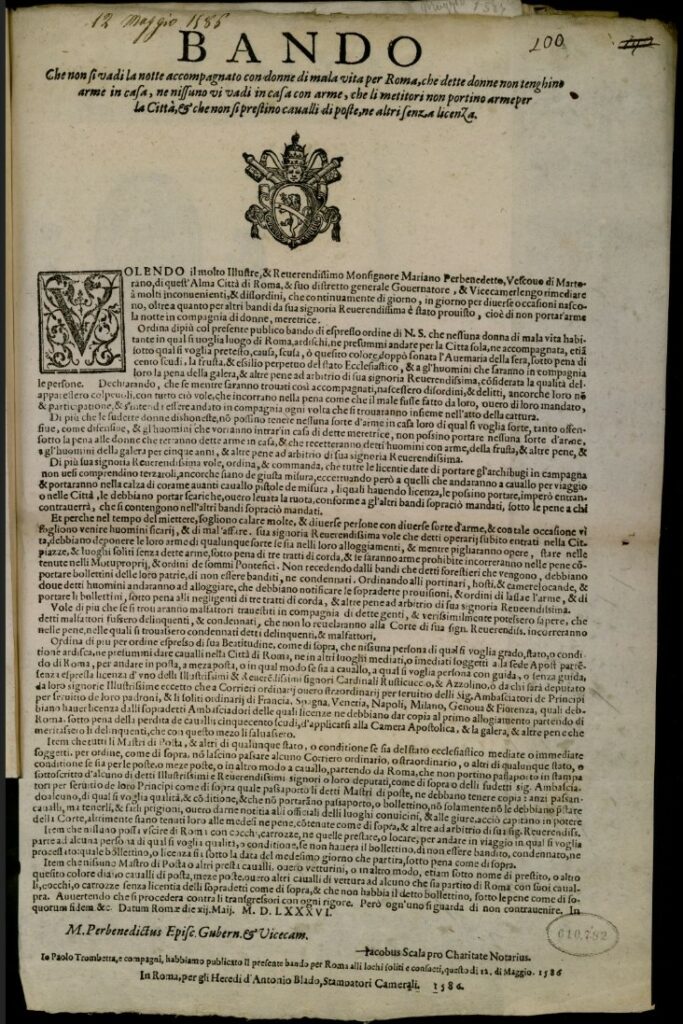Glossary
Proclamation

Other languages
- Dutch: proclamatie, gebod, ordinantie, ordonnantie, decreet, aankondiging, biljet, plakkaat, edict, ‘saeyboecxken’, mandement (eccl.), (pauselijke) bul
- French: proclamation, ordonnance, décret, mandement (eccl.), bulle (pontificale)
- German: Proklamation, Verordnung, Ordonnanz, Dekret, Mandat, Edikt, (päpstliche) Bulle
- Italian: proclama, decreto, statuto, capitolo, bando, manifesto, bolla (papale)
- Polish: proklamacja, ordynacja, mandat, statut, dekret, bulla (papieska), konstytucja (sejmowa)
- Spanish: proclamación, decreto, ordenanza, pregón, bando, edicto, bula (eccl.)
Material form
Printed book, Single-sheet printSubject
Commerce and administration, News and current affairsDescription
Proclamations or ordinances, usually from the state government, notified the population of official decrees and laws. In the Low Countries these broadsides were often referred to as placard or plakkaat, from the French word referring to the act of pasting the proclamation or ordinance to a wall or board specifically designed for this purpose. Official proclamations needed a governmental sign and were required to be decreed aloud as well.
These kinds of proclamations, especially in the Low Countries in the wake of the revolt, fuelled another genre of ‘rebel broadsides’, unofficial and polemic prints in the same style, often illegally pasted in public spaces. Both this type of polemic ordinance and the official proclamations were often locally printed, because otherwise they ran the risk of already being outdated upon arrival.
In France, conversely, official proclamations were not printed as broadsheets but as booklets, usually in octavo.
Related terms
statute, announcement, decree, ordinance, (hand)bill, (papal) bull, broadsheet
Sources
S. González-Sarasa Hernáez, Tipología editorial del impreso antiguo español, thesis Universidad Complutense de Madrid (2013), 496-497 (‘Decreto’), 511-513 (‘Ordenanzas’), 516-517 (‘Pregón’), 528-529 (‘Bula’), 627-629 (‘Bando’), 638-639 (‘Edicto’). https://eprints.ucm.es/id/eprint/24020/
M. Grillo, Leggi e bandi di antico regime (Cargeghe: Editoriale Documenta, 2014).
A. Pettegree, A. der Weduwen, The Bookshop of the World. Making and Trading Books in the Dutch Golden Age (New Haven/London: Yale University Press, 2019), chapter 8, ‘The Men on the Cushions’.
S. Limbach, ‘Tracing Lost Broadsheet Ordinances Printed in Sixteenth-Century Cologne’, in: F. Bruni and A. Pettegree (eds.), Lost Books: Reconstructing the Print World of Pre-Industrial Europe (Leiden: Brill, 2016), 488-503.
J. Verberckmoes, V. Soen, ‘Broadsheets Testing Moderation in the Nascent Dutch Revolt’, in: A. Pettegree (ed.), Broadsheets: Single-Sheet Publishing in the First Age of Print (Leiden/Boston: Brill, 2017), 269-294.
R.M. Versendaal, Le mandement joyeux et la culture joyeuse en France et dans les anciens Pays-Bas (XVe-XVIIe siècles), dissertation Utrecht University, 2022. https://doi.org/10.33540/1320

